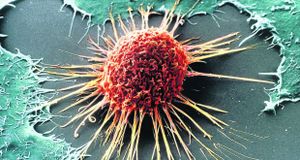Posted on over 8 years ago by Larry O'Leary

New cancer treatment ‘can eradicate tumours completely’
Scientists believe they have made a significant breakthrough in anti-cancer therapy
Scientists have discovered a process to trigger the death of cancer cells that they believe could be more effective than current methods.
The new method of killing cancer cells — called caspase-independent cell death (CICD) — led to the complete eradication of tumours in experimental models.
Currently, most anti-cancer therapies (chemotherapy, radiation and immunotherapy) work by killing cancer cells through a process called apoptosis, which activates proteins called caspases, leading to cell death.
However, apoptosis often fails to kill all cancer cells, leading to disease recurrence, and can also have unwanted side-effects that may even promote cancer.
The University of Glasgow scientists wanted to develop a way to improve therapy that induces cancer-cell killing while also mitigating unwanted toxicity.
Dr Stephen Tait said: “Our research found that triggering CICD, but not apoptosis, often led to complete tumour regression.
“Especially under conditions of partial therapeutic response, as our experiments mimic, our data suggests that triggering tumour-specific CICD, rather than apoptosis, may be a more effective way to treat cancer.”
Inflammatory proteins
Unlike apoptosis, which is a silent form of cell death, when cancer cells die through CICD they alert the immune system through the release of inflammatory proteins.
The immune system can then attack the remaining tumour cells that evaded initial therapy-induced death.
The researchers used lab-grown colorectal cancer cells to show the advantage of killing cancer cells via CICD. However, these benefits may be applicable to a wide-range of cancer types.
Dr Tait added: “In essence, this mechanism has the potential to dramatically improve the effectiveness of anti-cancer therapy and reduce unwanted toxicity. Taking into consideration our findings, we propose that engaging CICD as a means of anti-cancer therapy warrants further investigation.”
Dr Justine Alford, Cancer Research UK’s senior science information officer, said: “Although many cancer treatments work by triggering apoptosis, that method sometimes fails to finish the job and instead may lead to the tumour becoming harder to treat.
“This new research suggests there could be a better way to kill cancer cells which, as an added bonus, also activates the immune system. Now scientists need to investigate this idea further and, if further studies confirm it is effective, develop ways to trigger this particular route of cell death in humans.”
The research paper, Mitochondrial permeabilisation engages NF-kB-dependent anti-tumour activity under caspase deficiency, is published in Nature Cell Biology.
The paper was majority funded by Cancer Research UK.